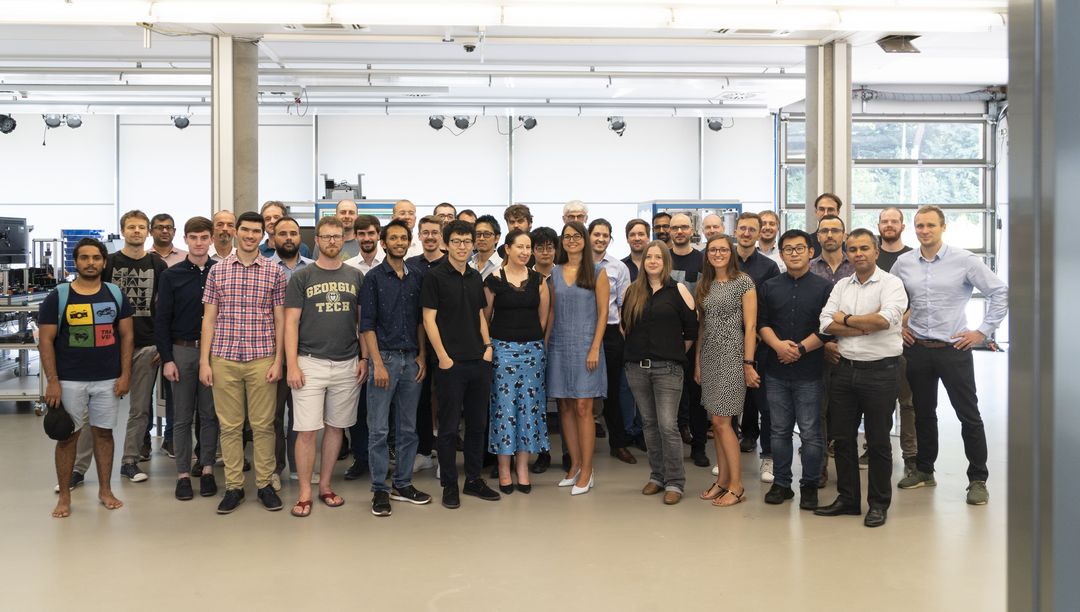Digitalization in the construction industry is increasing and with it the potential for artificial intelligence applications in this sector as well. In this context, the industry in Europe faces three major challenges:
- Improving productivity
- Increasing safety and the well-being of the workforce,
- Transitioning to a green, resource-efficient industry.
"In the HumanTech project (Human Centered Technologies for a Safer and Greener European Construction Industry), funded by the European Union, we are addressing these challenges and over the next three years we will develop human-centered concepts of worker-machine collaboration, digital twins, intelligent protective and support equipment for workers, and robotic technologies to enable environmentally friendly and harmonious collaboration between humans and autonomous construction machines, while contributing to the industry's green transformation," explains Dr. Jason Rambach, the project's coordinator and head of the Spatial Sensing and Machine Perception team (Augmented Reality/Augmented Vision department, Prof. Didier Stricker) at the German Research Center for Artificial Intelligence (DFKI) in Kaiserslautern.
The scientists are developing and using various technologies such as exoskeletons, wearable body pose and load sensors, image recognition software, cameras and XR glasses for extended reality applications and construction site inspections. Workers and cooperating robots are localized and navigated in real time to perform their tasks efficiently and precisely as a team.
The TU Kaiserslautern is involved in the project as a co-coordinator. "In the university's potential area "Construction Site of the Future," which is funded as part of the Rhineland-Palatinate research initiative, we are already networking computer science and engineering research and working with cooperation partners from industry. Technologies that we are developing further within this framework, such as Building Information Modeling (BIM), also play a decisive role in HumanTech," says Prof. Christian Glock from the Department of Concrete structures and structural design, spokesman for the potential area. With the help of BIM methodology (Building Information Modeling), which is already being used in construction, the entire processes on a construction site, including technology, can be mapped in virtual space. "Using a digital twin, it is possible, for example, to simulate planning sequences in different variants and thus optimize them," adds Fabian Kaufmann, a research assistant in the solid construction and design department who is playing a leading role in the project.
The consortium attaches great importance to the user-friendliness of the systems and compliance with European standards in the field of artificial intelligence (AI) ethics.
The project is funded with more than nine million euros by the European Union as part of the "Horizon Europe" program. In this context, DFKI Kaiserslautern will receive about 1.4 million euros, TUK more than 900 thousand euros and SciTrack GmbH, a joint spin-off of TUK and DFKI, more than 300 thousand euros.
On July 20, the kick-off meeting was held at DFKI in Kaiserslautern.
Partners:
- DFKI (coordinator)
- Technical University of Kaiserslautern
- Hypercliq IKE
- Scaled Robotics SL
- Federal Institute for Occupational Safety and Health
- Sci-Track GmbH
- SINTEF Manufacturing AS
- Acciona construccion
- STAM SRL
- Holo-Industry 4.0 Software GmbH
- Fundacion Tecnalia Research & Innovation
- Catenda AS
- Technological University of the Shannon : Midlands Midwest
- Ricoh international BV
- Australo Interinnov Marketing Lab SL
- Baubot GmbH
- Universita degli Studi di Padova
- European Builders Confederation
- Palfinger Structural Inspection GmbH
- Zurich University of Applied Sciences
- Implenia Switzerland AG
- Kajima corporation
Sponsor:
EU - European Union
Grant agreement number:
101058236

